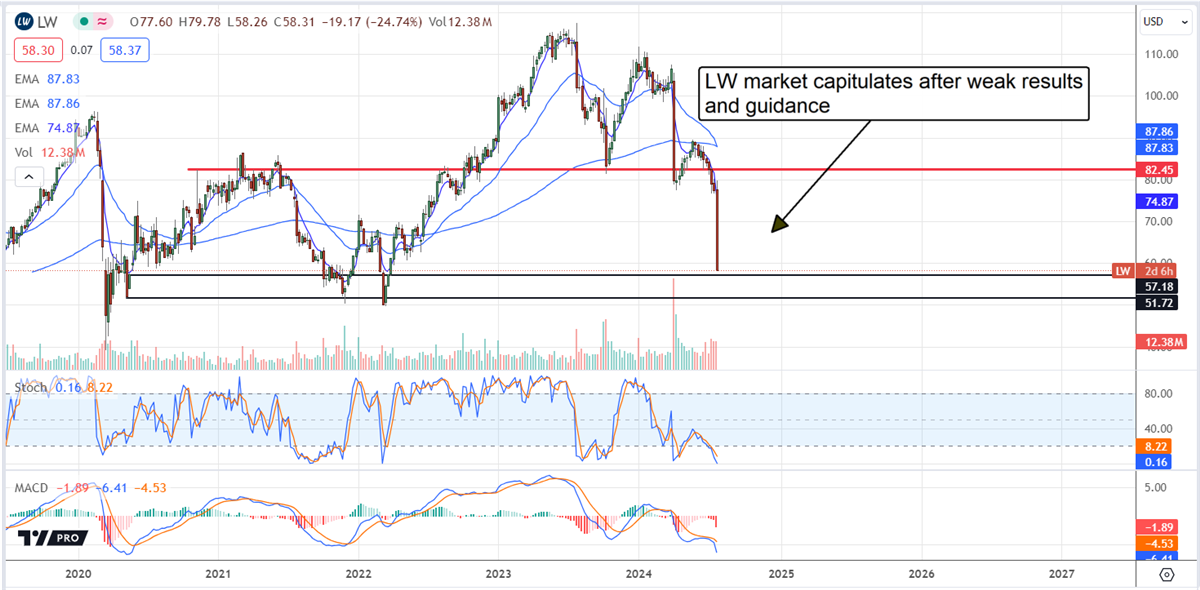
Lamb Weston (NYSE: LW) share prices got fried after Q4 results were worse than expected. The move shaved 20% off the share price, putting the market near long-term lows, but now is not the time to sell. As bad as the implosion looks, the existing market is capitulating and setting up an attractive buying opportunity for new investors. While headwinds persist, the company’s results aren’t as bad as they look, and there are catalysts ahead for consumer staples.
Sluggish restaurant sales globally are among the causes of poor performance, a dynamic that will change over the next four quarters because of lower interest rates. The FOMC is expected to lower rates at least once this year, possibly twice, and to continue cutting in 2025. With this in play, the guidance is likely cautious, and investors can expect an upgrade cycle in the back half of the fiscal year, extending into the back half of the calendar year.
Lamb Weston Has a Weak Quarter Compounded by a Recall
Lamb Weston had a weak quarter, missing estimates on the top and bottom lines, but the big news is the sharp contraction in earnings. While the contraction is concerning, it is due to a voluntary product recall that accounts for more than 50% of the decline. The top-line revenue of $1.61 billion is down compared to last year and missed the consensus by a slim 580 bps compared to the larger 3800 basis points bottom-line miss. Guidance for the new fiscal year is also weaker than expected but likely cautious, given the economic outlook.
Lamb Weston’s $1.61 billion in revenue is down 5.3% year-over-year due to an 8% decline in volume offset by a 3% gain in price and mix. A global slowdown in restaurant volumes and the exit of lower-margin businesses are blamed for roughly 25% of the decline; the remainder is due to the recall.
Margin news is mixed. The company widened its gross margin and lowered its SG&A expenses, setting itself with leverage offset by the recall expense. The recall is estimated to have impacted adjusted revenue by $40 million or 55% of the YoY decline, and the impact on net earnings is comparable. Operating income is up due to improved operational quality but offset by recall expenses that left the adjusted earnings at $0.78 or down 40% YoY.
Guidance is what has the market moving lower. The company issued guidance for revenue and earnings in a range below the consensus, sapping market sentiment but leaving the capital return outlook in fine shape. The dividend is only 30% of the earnings guidance and safe, leaving ample room for share repurchases and capital expenditures in addition to the yield. The yield is at historical highs, near 2.4%, now that the share price has been discounted. CAPEX is estimated at $850 million and will target capacity stabilization and stimulating growth.
Lamb Weston Builds Value for Shareholders
Lamb Weston built value for shareholders in F2024 despite its headwinds. Highlights from the cash flow and balance sheet include a negative cash flow year and a reduction in cash balance offset by acquisitions, improving assets, and rising equity. Debt is also up but offset by positives, which left equity up 26% YoY. Share repurchases add to the value, reducing the count by an average of 1.2% for Q4.
Analysts may cap Lamb Weston’s share price advance this year. However, the sell-off is overblown, putting the stock at a deep value and trading at rock bottom near the 2020 lows. The fall to $60 has the market over 50% below the lowest analysts' target, and the sentiment is firm at Buy. The company’s struggles are not over; the salient point is that its position as the world’s leading french fry supplier and supplier to McDonald’s (NYSE: MCD) has it positioned for long-term success. It is also a value relative to its peers, trading at only 10.8x the guidance midpoint, and it is among the cheapest consumer staples available today.





